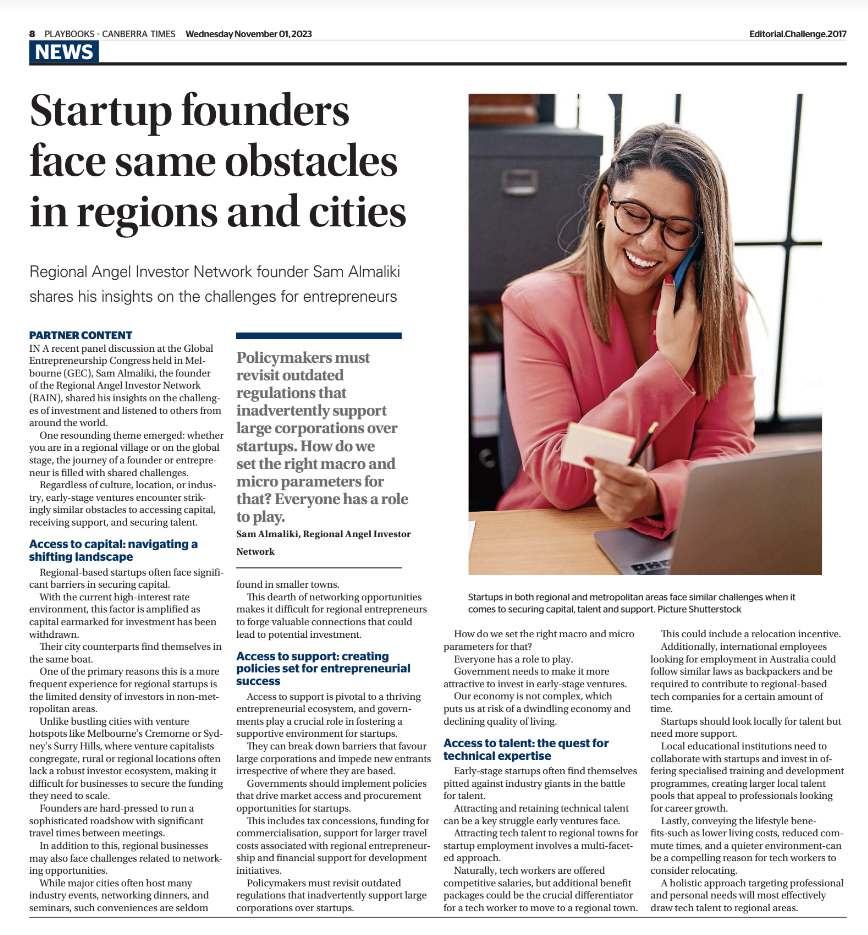In a recent panel discussion at the Global Entrepreneurship Congress held in Melbourne (GEC), Sam Almaliki, the founder of the Regional Angel Investor Network (RAIN), shared his insights on the challenges of investment and listened to others from around the world.
One resounding theme emerged: whether you are in a regional village or on the global stage, the journey of a founder or entrepreneur is filled with shared challenges.
Regardless of culture, location, or industry, early-stage ventures encounter strikingly similar obstacles to accessing capital, receiving support, and securing talent.
Access to capital: navigating a shifting landscape
Regional-based startups often face significant barriers in securing capital.
With the current high-interest rate environment, this factor is amplified as capital earmarked for investment has been withdrawn.
Their city counterparts find themselves in the same boat.
One of the primary reasons this is a more frequent experience for regional startups is the limited density of investors in non-metropolitan areas.
Unlike bustling cities with venture hotspots like Melbourne’s Cremorne or Sydney’s Surry Hills, where venture capitalists congregate, rural or regional locations often lack a robust investor ecosystem, making it difficult for businesses to secure the funding they need to scale.
Founders are hard-pressed to run a sophisticated roadshow with significant travel times between meetings.
In addition to this, regional businesses may also face challenges related to networking opportunities.
While major cities often host many industry events, networking dinners, and seminars, such conveniences are seldom found in smaller towns.
This dearth of networking opportunities makes it difficult for regional entrepreneurs to forge valuable connections that could lead to potential investment.
Access to support: creating policies set for entrepreneurial success
Access to support is pivotal to a thriving entrepreneurial ecosystem, and governments play a crucial role in fostering a supportive environment for startups.
They can break down barriers that favour large corporations and impede new entrants irrespective of where they are based.
Governments should implement policies that drive market access and procurement opportunities for startups.
“Policymakers must revisit outdated regulations that inadvertently support large corporations over startups. How do we set the right macro and micro parameters for that? Everyone has a role to play.”
Sam Almaliki, Regional Angel Investor Network
This includes tax concessions, funding for commercialisation, support for larger travel costs associated with regional entrepreneurship and financial support for development initiatives.
Policymakers must revisit outdated regulations that inadvertently support large corporations over startups.
How do we set the right macro and micro parameters for that?
Everyone has a role to play.
Government needs to make it more attractive to invest in early-stage ventures.
Our economy is not complex, which puts us at risk of a dwindling economy and declining quality of living.
Access to talent: the quest for technical expertise
Early-stage startups often find themselves pitted against industry giants in the battle for talent.
Attracting and retaining technical talent can be a key struggle early ventures face.
Attracting tech talent to regional towns for startup employment involves a multi-faceted approach.
Naturally, tech workers are offered competitive salaries, but additional benefit packages could be the crucial differentiator for a tech worker to move to a regional town.
This could include a relocation incentive.
Additionally, international employees looking for employment in Australia could follow similar laws as backpackers and be required to contribute to regional-based tech companies for a certain amount of time.
Startups should look locally for talent but need more support.
Local educational institutions need to collaborate with startups and invest in offering specialised training and development programmes, creating larger local talent pools that appeal to professionals looking for career growth.
Lastly, conveying the lifestyle benefits-such as lower living costs, reduced commute times, and a quieter environment-can be a compelling reason for tech workers to consider relocating.
A holistic approach targeting professional and personal needs will most effectively draw tech talent to regional areas.
Media Contact | Will Richards | [email protected]





